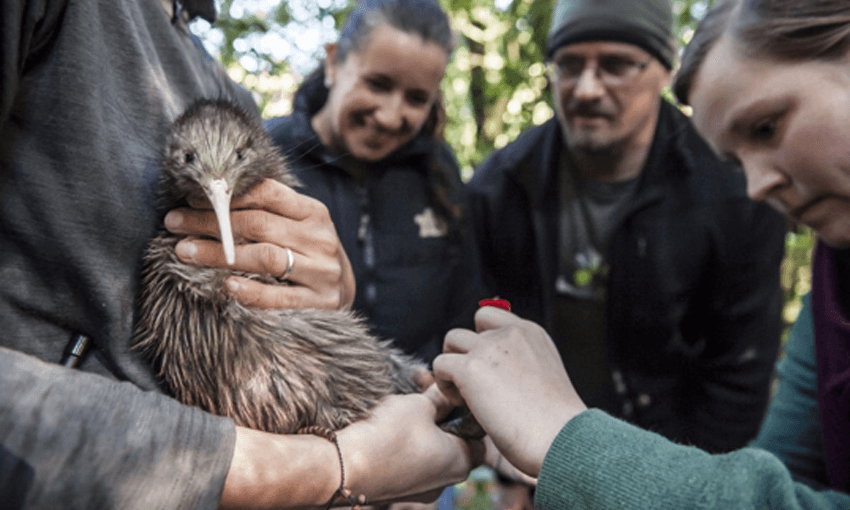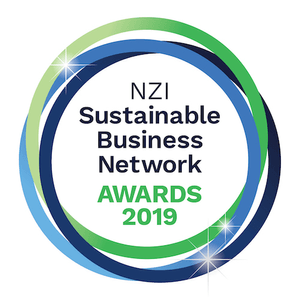Squawk Squad is at the forefront of the predator control and pest trapping movement, and co-founder Fraser McConnell has just won a Sustainable Business Award for its work. He spoke to Alex Braae about why he sees that work as so important for the future.
Fittingly for someone who has just been crowned as a ‘millennial on a mission’ at the NZI Sustainable Business Network Awards, Fraser McConnell spends a lot of time thinking about generations – specifically, the next one. McConnell is a serial volunteer and entrepreneur, a hoiho voter in the recent Bird of the Year competition, and the co-founder of Squawk Squad, a social enterprise that has basically gamified the process of pest control.
People donate money to fund the most effective traps on the market, either fully funding a trap outright or providing a contribution towards one. They then get mobile notifications to show just how many predators have been taken down by their traps and their stats are tracked on a nationwide leaderboard to show how much of a difference they’ve made.
It makes protecting native birds “addictively awesome,” says McConnell.
The traps are self-resetting as well, so thousands of hours of labour can be saved, and it means that resource-stretched sanctuaries can operate much more efficiently. They’ve had a lot of success in the process, expanding out to more than a thousand donors (Squawkers, as McConnell calls them) and has traps in four sanctuaries across the country.
But it’s the educational side of Squawk Squad which is really exciting McConnell now. And it’s the multifaceted approach – providing real solutions to New Zealand’s predator problem, but also teaching New Zealanders, especially the next generation of Kiwis, about why it’s important – that was acknowledged at the NZI Sustainable Business Network Awards.
Squawk Squad’s education role is heavily focused on schools – those who will inherit the environment. But also has a wider element of engaging New Zealanders in conservation, and particularly caring about the protection of native species.
“We approached this through our kaupapa first, which to begin with we were doing marketing about the challenges we face and the environment of New Zealand. But it didn’t feel authentic to be marketing in this area when there was such a big education piece to be delivered here,” said McConnell.
“Realising that we decided to take it to the education system, with the intent of teaching our tamariki to be kaitiaki of the future, inspiring them to protect the environment more, and also take that message out to their whanau.”
Over the last three years, 45,000 kids have been part of a Squawk Squad school programme. They’re designed to be fun, which is a way of making grim topics like kauri dieback something that kids want to engage with. Classrooms plant trees and clean up rivers, but also start thinking about wider things they can do.
“I guess the really inspiring thing is that they’re learning about global challenges, and then they’re really taking local action.”
And it’s all focused on the future. For the ambitious Predator Free 2050 goal to be reached, people who are kids today are going to have to keep focusing on it tomorrow.
“They’re going to be the ones here in 2050, not us,” said McConnell. “They’re really showing us; if classrooms of Kiwi kids are taking this action, why can’t all of us?”
It’s an important time for Squawk Squad to be operating, with a boom in community groups getting involved in conservation and pest control. McConnell says he’s noticed a turning point in the wider conservation movement in the last few years, and especially since the 2016 announcement of the Predator Free 2050 goal.
“I guess there is a bit of a critical mass. We’re certainly seeing people becoming more aware of the crisis native birds are in.”
McConnell’s own journey to founding Squawk Squad came from what he sees as an inherent love of nature that many New Zealanders grow up with, and a period of reckoning in his life when he had to think deeply about how he wanted to spend the rest of it. His best friend had just passed away, and McConnell was about to start a corporate career which didn’t quite inspire him.
He decided that he needed to find more purpose in his life. He began researching the facts around conservation in New Zealand and learned just how bad things were for many native species.
“It can take some pretty brutal adversity to wake you up at times. The last thing I wanted was to go into the world, just looking at the default of wealth, status and profit. Instead, it was about finding what we could do that would have the biggest impact on Aotearoa New Zealand.”
While the Predator Free 2050 goal is hugely ambitious McConnell believes it can and will be reached. That optimism isn’t necessarily because of current technology, but because with enough people caring about the topic, there will be plenty of minds being put towards solving problems. That’s why Squawk Squad has prioritised education to take as many New Zealanders with them.
“If it’s not us who figures out the solution, I have no doubt it’s going to be one of these kids in our programmes.”
The Spinoff is the sponsor of the “millennial on a mission” category at the 2019 NZI Sustainable Business Network Awards.

